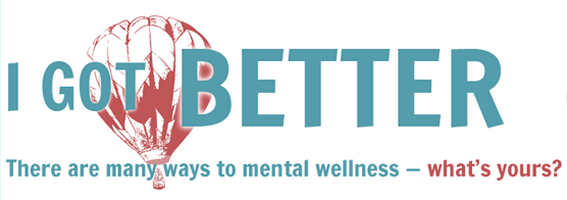In light of the recent shooting in Connecticut, I feel that this topic has even more gravity than it did while I was writing it. My heart goes out to those who are suffering. Hopefully, with better communication, we can avoid these events in the future.
We share our mental states with one another daily, we share our sorrows, our joys, but what of the mentally ill? What of those who have more than just sorrow, but paranoia? What of those who feel the ever looming threat of being ostracized because of their mental states? Those who need more than a hug, but a chemical-altering drug, or intensive therapy?
I Got Better is a project about sharing our experiences with each other, ranging from anxiety, to depression, to schizophrenia and bipolar disorders. The idea is that those that suffer psychologically are human too, and that the act of sharing these stories gives hope to others, and it could lessen the stigma faced by those who suffer from "mental illness." The hope is to open dialogue and to change the way people think about mental disorders. I decided to share my own story:
There is a real need to share our stories with one another as a form of activism for the mentally ill. Since 1998, the number of mentally ill people in prisons has quadrupled to 1.25 million from 283,000, according to the Human Rights Watch. The same demographic is also just as likely to be homeless. This needs to change, now, and fast.
Mental illness hasn't always been a thing to be ashamed of. In fact, the poor treatment of the mentally ill is a fairly recent development. It wasn't until the 1600's that we see atrocious treatment of the mentally ill. Europeans began to isolate the mentally ill, housing them with miscreants and vagrants. Those considered insane were increasingly treated inhumanely. They were chained to walls and kept in dungeons.
Before this, we see examples of the mentally ill, so long as they were not violent, being housed with family and cared for by the community. Pythagoras and Socrates had hallucinations, both are said to have heard voices. They were revered by their communities and left legacies lasting thousands of years.
The modern treatment of the mentally ill begins with Phillippe Pinel, who changed the way that many asylums operate, and there were drastic improvements in treatment with the discovery of lithium (a mood stabilizer still used for those with bipolar disorder) in 1949. Today, those with mental disorders can access an arsenal of incredibly expensive chemicals if they have health insurance, but even this isn't proving adequate, though treatment has improved since the tortures of the past.
No progress would’ve been possible without activists, physicians, and the ill sharing their personal experiences with mental health. It’s in this openness we see improvement. It’s with repression that we see things get worse and worse. In order for our society to take mental health seriously, we have to be open about our experiences, and share them with one another, and the world. If we want to be a humane society, we cannot let this problem fester anymore.
Take the first step. Share your story, please, or listen to other's at IGotBetter.org or simply ask your friends and family about their experiences. This is more important than you could ever imagine.









